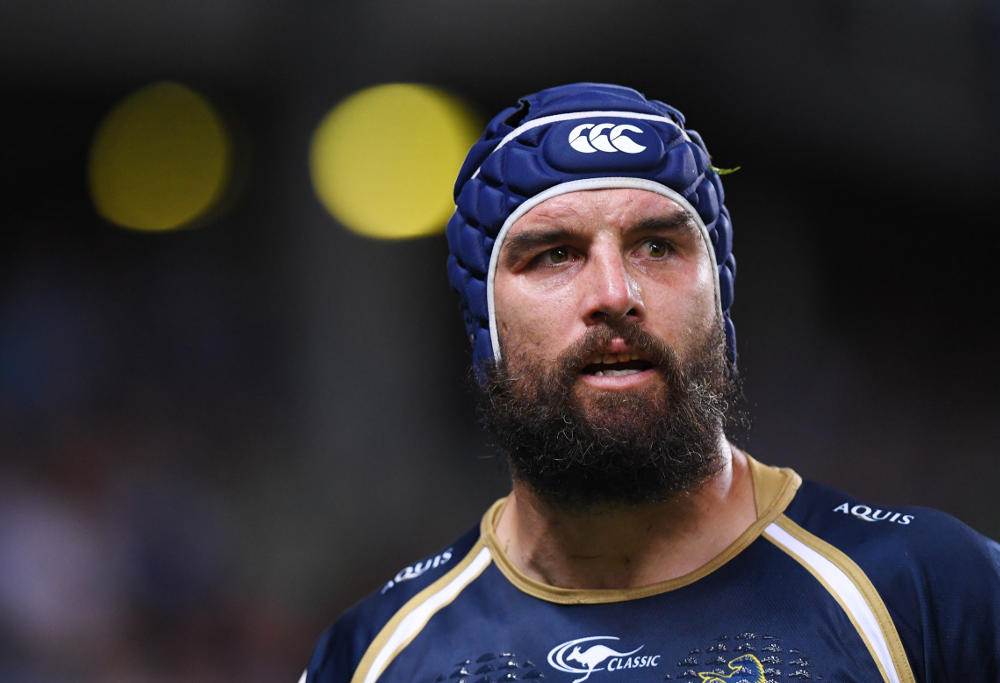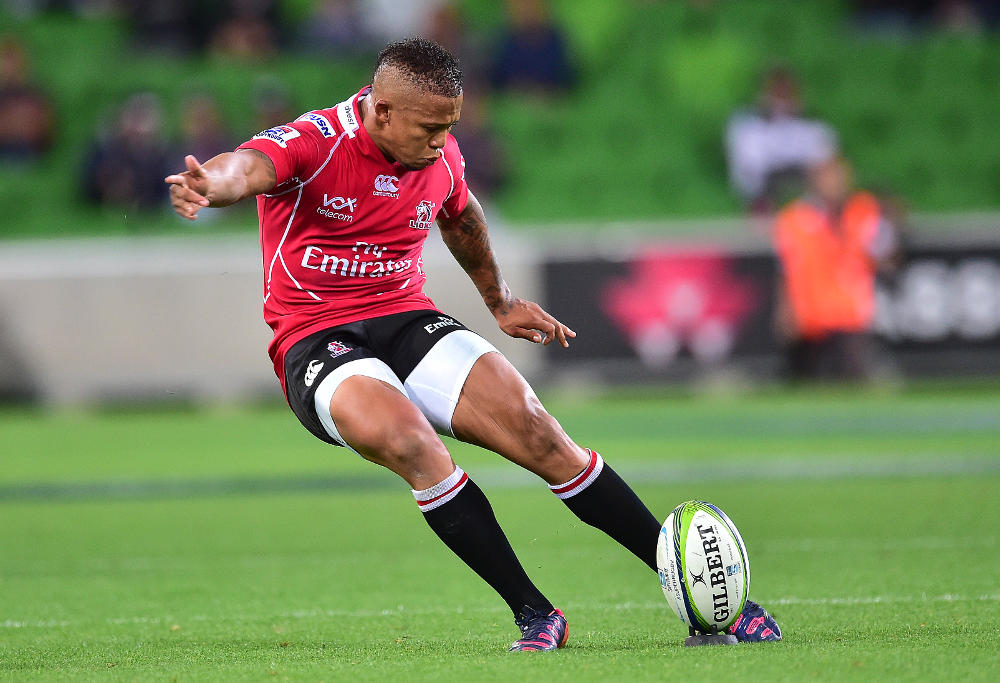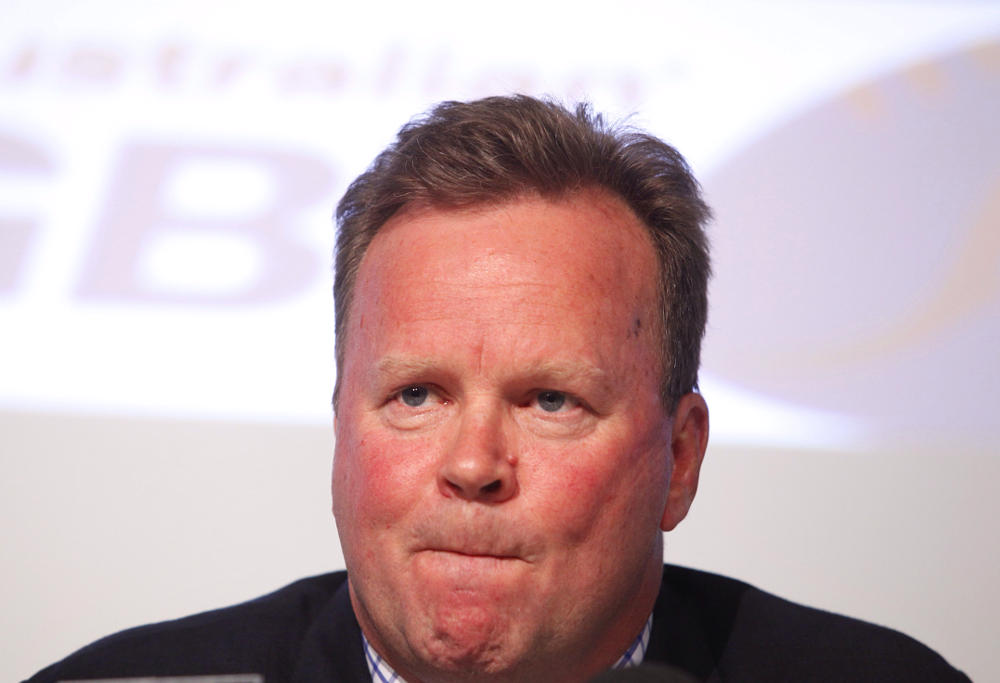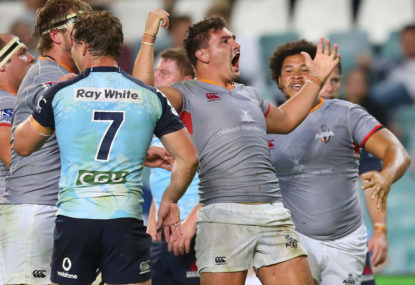The state of Australian rugby is such that two log points, like the ones gained by the Rebels for their unlikely 9-9 draw against the Sharks, go a long way – the closeness of the Australian conference is at least providing an edge that the quality of the rugby currently doesn’t.
Hidden away in the graveyard shift and largely unwatched, this was a remarkable match for a number of reasons. A tryless Super Rugby game is a rarity. Unfortunately, this weekend at least, there was a plethora of skill and handling errors.
The Sharks were off their game, so much so that if they’d been playing the Waratahs, this match would probably have ended nil-all. Budding star Curwin Bosch was symptomatic of his side’s ills, missing two kickable penalties and touch from a penalty.
For the second successive week the Rebels were untidy, but they stayed in the scrap, aided by a one-man advantage for 30 minutes. It would have been 50 minutes if not for skipper Nic Stirzaker channelling his inner Beauden Barrett, twice slapping the ball down. It was instinctive but lazy.
There were three shining lights: Sefanaia Naivalu running with the pace and purpose of a true Test winger, NRC graduate prop Tyrell Lomax showing a deft skill set well beyond his young years and flanker Will Miller, straight out of Sydney club rugby, relishing the step up and having a field day at the breakdown.
But in a match full of lows the nadir was the TV comments man, ex-Springbok Butch James, somehow setting a lower bar than Fox Sports’ Phil Kearns. Upon Shark’s centre Andre Esterhuizen receiving a red card for lifting Naivalu after the whistle and dumping him dangerously on his head, James noted that a shaken Naivalu had reacted by shoving the ball into Esterhuizen’s face. “I know it was a terrible tackle, but it (the penalty) should be reversed,” he said.
James’ own career was soured by a reputation as a sniper, employing dangerous ‘no arms’ and high tackles. It seems that the passing of time and the responsibility of a microphone has done nothing to instil any common sense.

The Brumbies have caused the Hurricanes plenty of grief in recent years and, taking a 21-14 lead into halftime in Napier, they looked in good shape to continue, but a remarkable 90-metre sweeping try to Joe Powell was a reminder of their scintillating form of a fortnight ago.
Seven tries and 42 points later, coach Steve Larkham must have felt like the mayor of Hiroshima, wondering what just happened. Beauden Barrett, Ardie Savea and a high-quality Hurricanes team that is every chance of going back to back this year; that’s what happened.
It was great to see that news of Super Rugby’s woes hasn’t reached Napier, with more than 30,000 locals fronting up and receiving a nice reward for doing so.
Not so in Sydney. A tried and true way to judge the crowd at the SFS is how much of the stadium sponsor’s name you can read in the seat pattern. In this case, it stood out like a beacon, the Waratahs and Kings failing to entice fans away from weekend chores.
It’s hard to imagine too many of those who did attend rushing back again. The Waratahs played a classic game of two halves: poor in the first half and appalling in the second.
It wasn’t as if the Kings were any good either. When referee Rohan Hoffman is close to best on ground, you know something isn’t quite working. As it turns out, the Hoff was pipped for the award by Chris Cloete, the Michael Hooper clone who out-Hoopered Hooper in his trademark categories of work-rate, pace, in-your-face abrasiveness and determination.
In truth, Cloete has been impressive all tour. He obviously works hard on his game in those brief few minutes he isn’t on the weights.
The home crowd did get one highlight in the first half – that of Kings winger Wandie Mjekevu flying through the air in a vain attempt to tackle the ghost of Rob Horne at the precise moment the real Horne shimmied left and strode away for his try.
Two plays summed up the Waratah’s malaise, both examples of the lack of innate awareness that seems so prevalent in Australian rugby. In a match that had tightened up in the second half, the Waratahs, ahead by five points, received a penalty in front of the Kings’ posts; a gift three points. Sniffing an opportunity, Bernard Foley tapped and ran. The play broke down and the moment was lost.
Perhaps on another day at another time this was the right play, but in this situation the certainty of going ahead by eight points should have taken precedence. A clear head would have ensured that this happened.
Then in the 72nd minute, with the Waratahs having been clueless or incapable of figuring out how to get the ball to wrecking machine Taqele Naiyarovoro for nearly an hour, they finally got the opportunity. Replacement Bryce Hegarty fielded a deep kick and ran into centerfield with Naiyarovoro looming on his left shoulder, itching for a run.
Inexplicably, Hegarty deemed himself more capable of busting through contact than the big Scotsman, and the opportunity died on the spot. Kings defenders breathed a sigh of relief at Hegarty’s lack of feel for what the game required.
By the time the ultimate humiliation was applied – a penalty try from a pushover scrum – the Waratahs had completed the most miserable Australian franchise performance this year, and all this, bear in mind, in a year full of hot competition.
None of this is to discount the achievement of the Kings, who despite the discomfort of playing with a noose around their necks did themselves and their fans proud.

In Johannesburg, the Lions seemed a little off their milk but still got the job done 24-21 against the Jaguares, dressed in what Billy Birmingham would surely describe as ‘canary yellow’. Next week’s Jaguares versus Sharks match shapes as crucial for both teams.
The ‘Riviera of the south’, Invercargill, turned on a lovely evening for the Highlanders and the Sunwolves, who, once they got over their inferiority complex and realised they could compete without kicking the ball away, again showed that they are making steady progress at this level.
The Highlanders did what they had to do, winning 40-15, but the feeling remains that they are a little off the standard set by the top three New Zealand sides.
In Christchurch, the Sky television feed advised that the Crusaders had won 37 of their last 38 home matches against South African opposition – a remarkable stat – and while it provides no comfort or excuse for Australia’s woes, it does provide some context.
From the 12th to the 40th minute of the first half the Crusaders were imperious, playing as well as any team has this year and taking the game completely away from the Stormers, who at least did the brave thing and turned up to compete hard in the second half.
It is the second-tier players who are impressing for the Crusaders, like unheralded halfback Mitchell Drummond, who is sneakily efficient, and Jordan Taufua, who grows another leg with Keiran Read beside him.
On second thoughts, some of the top-tier players stood out as well, including Ryan Crotty, Sam Whitelock and Read himself. And what about the superb positioning and one-handed release by Codie Taylor for Read’s first try? Quite superb.
The Stormers still have a big hand to play this season as they are almost assured of a home final. That’s if Dillyn Leyds can keep his pants on – he was comprehensively dacked in the eighth minute – but for now the tally shifts to 38 from 39 for the Crusaders.
Unfortunately, the 14,000 plus in attendance in Perth never got a game that rose to any heights, the Chiefs overcoming a ridiculous number of handling errors to hold out a competitive Force by 16-7.
The remaining match between the Bulls and Cheetahs was nothing to write home about either. The Bulls were at least able to win it with a high-quality counter-attacking try to Jesse Kriel, 20-14.

Another week has seen the ARU-SANZAAR saga go nowhere. With northern hemisphere clubs looking to finalise playing rosters for next season, there are understandably a number of local players growing increasingly agitated. But with lawyers now involved in all camps, billing in six-minute increments will do nothing to hasten a resolution.
The pall that hangs over Australian rugby cannot be lifted until this mess is resolved or until the Australian franchises start winning against teams other than themselves. Both seem very distant prospects right now.
Despite their honourable draw, the Rebels have basically run out of players and the Force are not far behind. On the surface, this strengthens the argument that five Super Rugby teams are too many, but of course it is more complex than that; the notion that players from the cut team will perfectly relocate themselves into where the remaining franchises are weak is flawed.
Beyond all of the emotional and side-issues, don’t forget that this all comes down to money – how much the northern hemisphere clubs have and how little the Super Rugby franchises and the ARU have.
Steven Luatua isn’t Australian but he illustrates the extent of the disparity, prepared as he is to walk away from a probable continuation of his All Blacks career, and from Super Rugby, to play second division rugby in England.
Much time and effort has been invested in Will Skelton. Some will scoff, but watch Saracens reap the benefits of that groundwork over the next two years.
It is the need to not allow Australian rugby to be picked apart that has driven the ARU to the position it now finds itself. If only they had found a smarter way to navigate the matter instead of the divisive, ham-fisted method they have chosen.
































































































